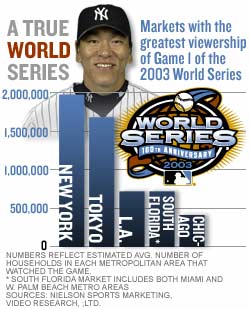
NEW YORK (CNN/Money) - More people watched the first game of the World Series in Tokyo than in any U.S. market besides New York.
That's the kind of international embrace of a U.S. sport that leagues are pining for as domestic dollars -- especially from broadcast fees -- appear to be maxed out. Major League Baseball, owing to the success of Japanese players like the New York Yankees' Hideki Matsui, just signed a reported $275 million, six-year deal to broadcast games in Japan, about 15 times what the current deal is worth.

Those kinds of numbers attract attention -- and capital.
The National Basketball Association, which just had a season-opening series in Japan, has 10 offices and extensive advertising campaigns overseas. The National Hockey League has shut down its season during the last two Winter Olympics to let its stars from around the globe play on their home countries' national teams. Even the National Football League, whose domestic revenue stream and fan support in the U.S. make it the envy of other sports, is spending money on an NFL Europe minor league, with spots reserved for local players.
But even as Major League baseball finds unprecedented success and big money in Japan, U.S. sports will find it much tougher to put together new big wins overseas.
| SportsBiz
|

|
| Click here for SI.com sports coverage
|
|
|
|
Mike Trager, a television consultant who has negotiated overseas rights deals for leagues in the past, said he doesn't think football has enough foreign-born players or participation outside the United States to see anything more than marginal international revenue. He said the NBA and NHL overseas efforts are already advanced enough to leave both leagues in a relatively slow-growth position going forward. Even baseball could see its recent overseas gains at risk, he said.
"Baseball is doing very well with a real break through in this contract," said Trager. "But if five years from now, these Japanese stars are out of the league and more Japanese stars haven't come to replace them, it could slide back again."
| Related columns
|

|
|
|
|
Foremost among the challenges faced by U.S. sports is that no other country throws the kind of money at broadcasting rights that U.S. networks do. For the most recent Olympics, for example, NBC paid $545 million for U.S. rights -- about three times the fees generated across the rest of the world.
Second, what makes a U.S. sport popular overseas is a star athlete from that country, like Matsui, succeeding. That helps baseball and the NBA. But that does little to lift the NFL, which has no major foreign stars.
And even in baseball and basketball many of the foreign-born stars are coming from countries in the Caribbean, South America or Eastern Europe, where the potential for big revenue gains is limited.
Finally, time zones pose problems. This year's World Series games 2 through 5 were shown on time delay in Japan rather than airing at about 9 or 10 a.m. weekdays. That hurt the ratings quite a bit -- none got above 10 percent viewership. Game 1, the only one broadcast live, was watched in 7.6 million Japanese homes at 9 a.m. on a Sunday morning. That's about 20 percent of homes there, compared to just under 11 percent of U.S. homes who tuned into the game during prime time Saturday evening.
There's likely some easy money to be made overseas, just not a whole lot of it.

|

